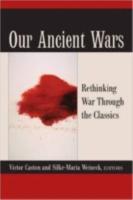
Michigan (2016) p/b 289pp £41.50 (ISBN 9780472052981)
‘War, what is it good for?’ asks Seth L. Schein (p. 211), one of the contributors to this volume. In asking this he follows The Temptations and later Bruce Springsteen, but not, Schein contends, Homer, whose nuanced portrayal of war in the Iliad transcends the moral and psychological simplicity of modern receptions.
So far, so familiar; in fact several of the papers collected in this volume, and originally delivered at a conference at the University of Michigan in 2012, go over well-trodden ground and well-known versions (Ben Hur, Gladiator, Christopher Logue’s War Music) in their study of receptions of ancient war, epic and tragedy. Other papers, however, take an approach to the subject of war which is refreshing not just in its interdisciplinary enthusiasm, but also in its focus on the viewpoints of veterans of modern wars. The analyses thus produced are at times painfully and deliberately anachronistic, but are often thought-provoking.
Ideas dealt with by contributors include genocide in ancient Greece, Socrates’ military service, ‘unnecessary wars’, and the use of dramatic performance to deal with trauma. The most successful papers offer a thoughtful and sometimes personal reading of modern experiences. Nancy Sherman addresses the issue of ‘moral injury’ through the workings of shame, comparing the shame of Sophocles’ Ajax to the shame of a US army major in Iraq who was ordered to pay a young girl $750 for the accidental killing of her family. Page duBois offers a provocative reading of ‘War and Slavery in the Movies’, as a way for today’s governments to foster a ‘general atmosphere of endless war’ (p. 260) by idealizing the figure of the slave and prompting the viewer to identify with the freedom-fighting slave/hero.
Notable is the absence of Rome (the exception being duBois’ discussion of slavery) from a volume about war as read through the classics. The omission is striking, and in some ways disappointing in its missed opportunities; however the focus on archaic and classical Greece does give the volume a thematic consistency, and the recurrence of characters, particularly Ajax and Achilles, across different approaches provides a common thread. Achilles is used in a range of ways by different contributors, as the uncontrolled antithesis of Socrates (p. 106), as a key illustration of ‘the two sides of war as teacher’ of both cruelty and compassion (p. 156), and as ‘a projection screen for the human passions and the erotic energies between the sexes’ (p. 253). Ajax, on the other hand, is applied consistently throughout the volume as a paradigm of modern responses to war, in his ‘psychological break’ (p. 126), in his ‘sense of betrayal’ shared by soldiers in Afghanistan (p. 276), and in his suicide, a scenario which ‘might be applied to soldiers suffering from the trauma of combat in any conflict ancient or modern’ (p. 200).
The active involvement of veterans in the conference that produced this volume, as contributors, audience members and subjects of case studies, gives the articles an unusual immediacy and consciousness of the world outside of scholarship. The human response to war plays an important part in unifying this collection, with an epilogue that calls for a stronger awareness of the distance between the scholar and the soldier. Peter Meineck, in his discussion of combat trauma and tragedy, observes that ‘Though warfare has changed considerably in the past 2,500 years, as have the cultures that generated the wars, basic human emotional response to war has not’ (p. 185), and this sense of shared experience makes the volume an interesting and touching read, opening up new and sometimes controversial ways of ‘rethinking’ about the relationship between the ancient and the modern.
Cora Beth Knowles
